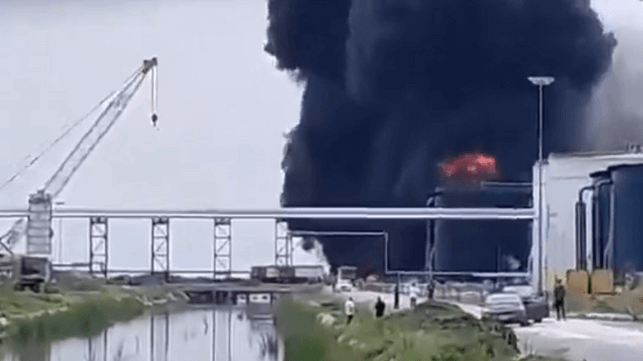Fire Breaks Out at Africa's Biggest Refinery

The Dangote Refinery, the newest and largest facility of its kind in Africa, reports that it sustained a "minor fire" on Wednesday. Video from the scene showed smoke and flame billowing from one corner of the plant, but the operator said in a statement that the blaze had no impact.
"We have swiftly contained a minor fire incident at our effluent treatment plant," said communications officer Anthony Chiejina in a statement. "There is no cause for alarm as the refinery is operating and there is no recorded injury or body harm [sic] to any of our staff on duty."
The long-delayed refinery project began production in January and is in a commissioning and ramp-up phase. It is a $20 billion endeavor, bankrolled by Africa's richest man, Aliko Dangote. When completed and fully online, the 650,000 bpd complex will be the biggest refinery in Africa and Europe.
Dangote Refinery fire incident: There is no cause for alarm says management pic.twitter.com/gimlNStJz6
— YEN (@YerwaExpress) June 27, 2024
It will rectify one of Nigeria's economic quandaries: though the nation has a wealth of oil and gas, it has historically had to export all of its production and import all of its refined products, since it has lacks efficient domestic refining capacity. Its four publicly-owned refineries have an "abysmal" performance record, with an average capacity utilization of just 15 percent, according to a study by Lizabetha Agbakahi of the University of Dundee. Since an estimated $3-5 billion of national oil revenue is lost to theft and corruption every year, the state financing available to invest in refining infrastructure is less abundant than it might seem from Nigeria's massive oil sales figures.
The privately-held Dangote refinery is big enough to supply all of Nigeria's domestic fuel needs, and should have enough capacity left over to export refined products to foreign markets. This will help reduce the cost of fuel for Nigerian citizens, who have seen prices skyrocket over the past year thanks to the cancelation of government subsidies. One hurdle: upstream oil producers in Nigeria have refused to sell crude to the new refinery, according to Dangote and the Crude Oil Refineries Association of Nigeria (CORAN). The refiners want to buy and sell using the local currency, the naira, so as to avoid the dollar shortage in cash-poor Nigeria. The Nigerian legislature recently enacted a law requiring domestic oil producers to sell their crude to domestic refiners first, though legal experts question whether the rule will be enforceable.
"I think that law was specifically put there by legislators not to starve the refineries. But what we have seen is a huge and still resistance by the producers of crude in Nigeria. They will rather prefer to export crude abroad to selling to local refineries," CORAN chairman Momoh Oyarekhua told Channels Television.
